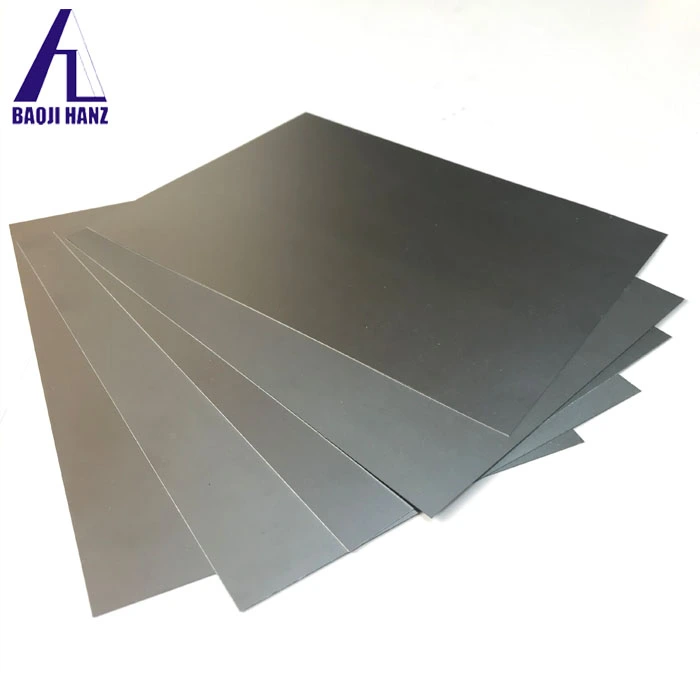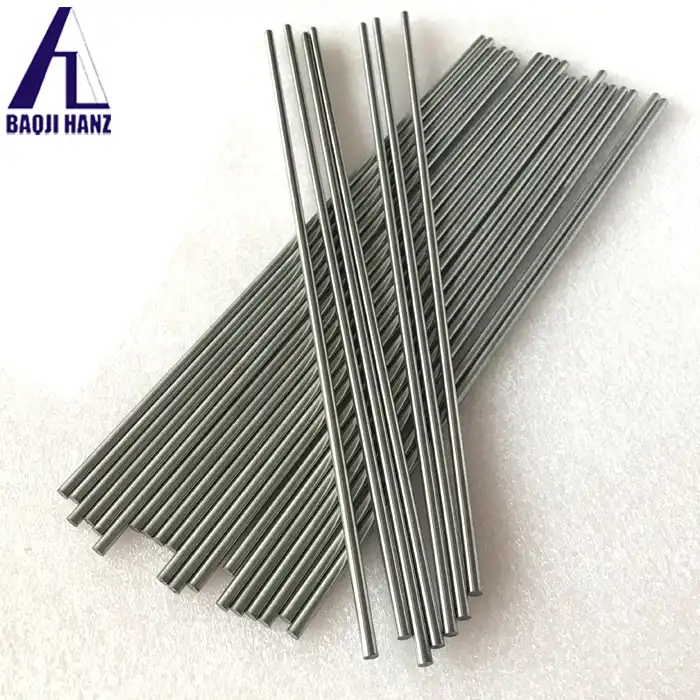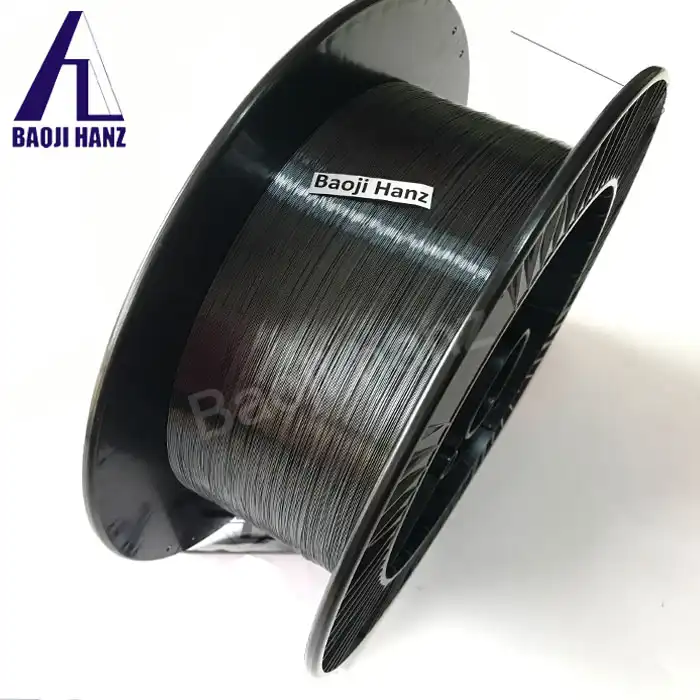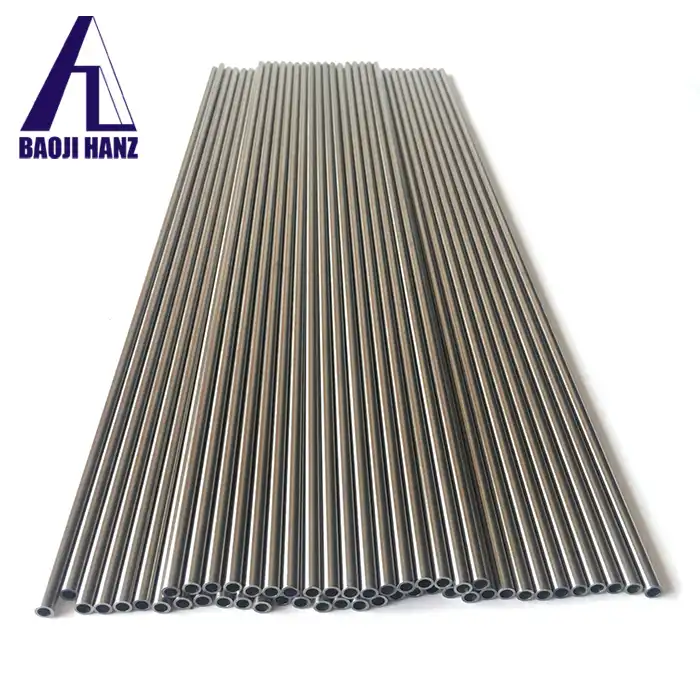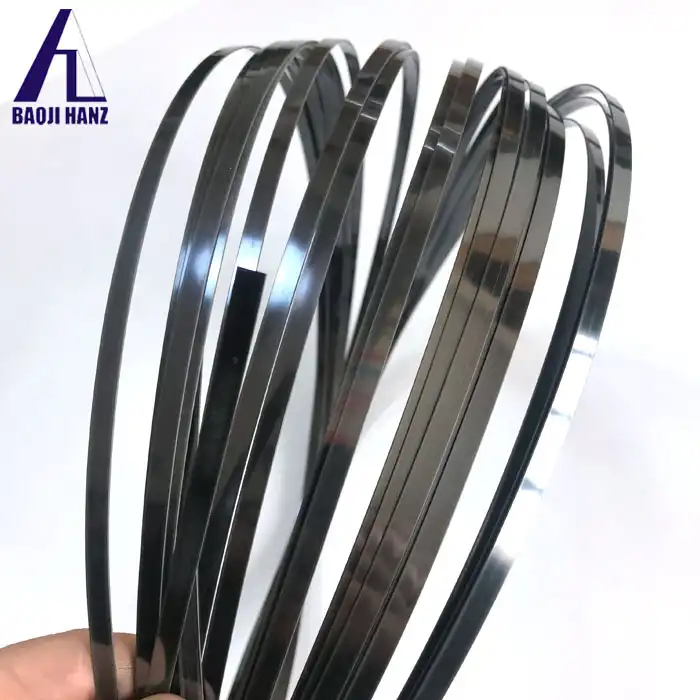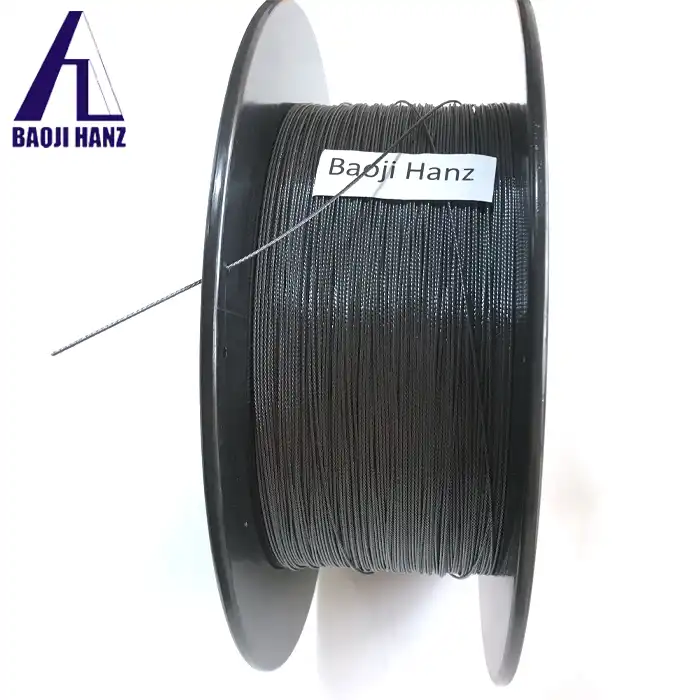What Factors Should Be Considered When Selecting a Capillary Nitinol Tube Supplier?
2025-03-28 19:28:33
When seeking a reliable supplier for capillary nitinol tubes, careful evaluation is essential to ensure product quality and consistency. Capillary nitinol tubes, with their unique shape memory and superelastic properties, require specialized manufacturing expertise that not all suppliers can provide. This article explores the critical factors to consider when selecting a capillary nitinol tube supplier, helping you make an informed decision for your specific applications in medical, aerospace, or industrial fields.
Choosing the right capillary nitinol tube supplier involves evaluating multiple factors including manufacturing capabilities, quality control systems, technical expertise, and industry experience. The supplier should demonstrate proficiency in producing precise specifications of capillary nitinol tubes with consistent quality. Additionally, factors such as competitive pricing, reliable delivery timelines, and responsive customer service play crucial roles in establishing a successful supply partnership for these specialized materials.
Manufacturing Capabilities and Quality Assurance
Advanced Production Equipment and Facilities
The manufacturing of high-quality capillary nitinol tubes demands sophisticated equipment and controlled environments. When evaluating potential suppliers, inquire about their production facilities and the technology they employ. Leading suppliers like Baoji Hanz Metal Material Co., Ltd. utilize advanced equipment for precise melting, extrusion, and drawing processes. These processes are critical in achieving the exact composition and dimensional specifications required for capillary nitinol tubes. The production typically begins with vacuum melting of nickel and titanium to form an alloy of precise composition, followed by specialized drawing processes to create tubes with consistent wall thickness. Superior manufacturing facilities should maintain strict environmental controls to prevent contamination during these delicate processes, as even minor impurities can significantly affect the performance of capillary nitinol tubes, particularly in medical applications where biocompatibility is essential.
Quality Control Procedures and Certifications
Quality assurance is paramount when selecting a capillary nitinol tube supplier. Reputable suppliers implement comprehensive testing protocols throughout the manufacturing process. They should conduct regular inspections to verify dimensional accuracy, including outer diameter consistency (such as the standard 1.61mm specification) and wall thickness uniformity (ranging from 0.1mm to 15mm). Material composition testing ensures the proper nickel-titanium ratio, which directly influences the tube's performance characteristics. Additionally, suppliers should perform mechanical property tests to verify superelasticity and shape memory capabilities. Industry certifications like ASTM F2633-07 compliance provide independent verification of quality standards. When evaluating suppliers, ask for detailed information about their quality management systems and whether they can provide test certificates with each shipment. This documentation becomes especially important for regulated industries such as medical device manufacturing, where material traceability is often a regulatory requirement.
Material Expertise and R&D Capabilities
The supplier's expertise in nitinol metallurgy significantly impacts product quality. Leading manufacturers invest substantially in research and development to enhance their understanding of nitinol properties and processing techniques. This expertise allows them to provide capillary nitinol tubes with optimized characteristics for specific applications. For instance, a supplier with strong R&D capabilities can develop customized heat treatment protocols that precisely tune the transformation temperatures of the capillary nitinol tubes according to application requirements. They should be able to explain how they achieve specific mechanical properties through processing techniques and demonstrate a deep understanding of factors affecting corrosion resistance and surface properties. Additionally, suppliers at the forefront of nitinol technology continually work on improving manufacturing methods to enhance product performance while reducing costs. Their ability to provide technical consultation on material selection and design considerations adds significant value, particularly for innovative or challenging applications utilizing capillary nitinol tubes.
Technical Specifications and Customization Options
Material Composition and Performance Characteristics
The precise composition of capillary nitinol tubes directly determines their functional properties. When evaluating suppliers, it's essential to understand the exact nickel-titanium ratio they offer and how this affects performance characteristics. Superior capillary nitinol tubes exhibit the remarkable shape memory effect, allowing them to return to their original form after deformation when heated above their transformation temperature. This property makes them invaluable for applications requiring controlled deployment or activation. Additionally, the superelasticity of properly manufactured nitinol allows these tubes to withstand substantial deformation—up to 8-10 times that of conventional metal alloys—without permanent damage. This extraordinary resilience enables designs that would be impossible with standard materials. Another crucial characteristic to consider is the corrosion resistance of the capillary nitinol tubes, particularly important in medical and chemical applications where exposure to bodily fluids or corrosive substances is common. The supplier should be able to provide detailed information about their material's fatigue resistance and damping capacity, which impacts long-term reliability in dynamic applications. Ask potential suppliers about their testing protocols for verifying these critical performance characteristics and request documentation of test results.
Dimensional Precision and Surface Finishes
The dimensional accuracy of capillary nitinol tubes is critical for many precision applications. Evaluate whether the supplier can consistently deliver tubes with tight tolerance control on parameters such as outer diameter (standard 1.61mm), wall thickness (ranging from 0.1mm to 15mm), and length (up to 6000mm). Superior suppliers implement rigorous inspection protocols to ensure dimensional stability throughout production batches. Surface quality is another crucial consideration, as it affects both functionality and biocompatibility. Different applications may require specific surface finishes—from mechanically polished to electropolished surfaces. For medical applications, the surface finish impacts biocompatibility and fluid flow characteristics, while in industrial applications, it might affect wear resistance or bonding capabilities. Ask potential suppliers about their surface treatment capabilities and their ability to meet specific roughness parameters. Additionally, inquire about their capacity to provide consistent surface properties across production batches, as this uniformity is essential for predictable performance of capillary nitinol tubes in critical applications. Reliable suppliers should be able to provide detailed specifications of their surface finishing processes and demonstrate consistent results through surface analysis documentation.
Customization and Processing Services
The ability of a supplier to provide customized solutions often determines the success of specialized applications. Leading capillary nitinol tube suppliers offer various processing services that add value and save development time. These services typically include precision cutting to exact lengths, custom bending to specific geometries, welding for assembly integration, decoiling for straightened sections, and specialized punching operations. When evaluating suppliers, inquire about their capabilities to customize wall thickness, diameter ratios, and alloy compositions for specific performance requirements. This flexibility becomes particularly important when standard specifications don't meet the unique demands of your application. For instance, medical device manufacturers might require capillary nitinol tubes with specific transformation temperatures for in-vivo applications, while aerospace applications might demand enhanced fatigue resistance properties. Assess whether the supplier offers design consultation to help optimize the material specifications for your particular use case. Companies like Baoji Hanz Metal Material Co., Ltd. provide comprehensive OEM services, working closely with clients to develop solutions that precisely match application requirements. Additionally, consider whether the supplier can offer custom packaging options that protect the delicate tubes during shipping and storage, as improper handling can compromise the performance characteristics of capillary nitinol tubes.
Supply Chain Reliability and Customer Support
Production Capacity and Delivery Reliability
When selecting a capillary nitinol tube supplier, production capacity and delivery reliability directly impact your operational efficiency. Evaluate the supplier's manufacturing volume capabilities and whether they can scale production to meet fluctuating demand without compromising quality. A supplier with limited capacity might cause production bottlenecks during high-demand periods. Leading suppliers maintain substantial inventories of standard capillary nitinol tube sizes (such as the common 1.61mm outer diameter tubes) to ensure quick fulfillment of routine orders. For custom specifications, assess their lead time estimations and track record of meeting delivery commitments. Reliable suppliers provide realistic timelines rather than overpromising and underdelivering. They should have robust logistics systems in place to ensure safe and timely transportation of these precision components. Capillary nitinol tubes require careful handling during shipping to prevent damage that could compromise their critical properties. Ask about their packaging protocols and shipping methods, particularly for international deliveries. Additionally, inquire about their ability to provide expedited production and shipping when urgent needs arise, as this flexibility can be crucial during tight project timelines or when facing unexpected material requirements for capillary nitinol tubes in ongoing production.
Technical Support and Documentation
Comprehensive technical support distinguishes exceptional capillary nitinol tube suppliers from merely adequate ones. Evaluate whether the supplier provides detailed material data sheets, processing guidelines, and technical consultation. For specialized applications, access to metallurgical expertise can significantly enhance product development and troubleshooting capabilities. Superior suppliers offer guidance on optimal heat treatment parameters, forming techniques, and surface finishing methods specific to your application requirements. They should be willing to collaborate on addressing technical challenges that might arise during your product development or manufacturing processes. Additionally, thorough documentation is essential for regulatory compliance, particularly in medical device manufacturing where material traceability is mandated. Reputable suppliers provide certificates of analysis, conformance documentation, and material test reports that verify the capillary nitinol tubes meet the specified ASTM F2633-07 or other applicable standards. This documentation should include verification of chemical composition, mechanical properties, and dimensional accuracy. When evaluating potential partners, assess the accessibility of their technical team and their willingness to engage in collaborative problem-solving. Suppliers who view the relationship as a technical partnership rather than merely transactional often provide superior value, especially when working with complex applications for capillary nitinol tubes.
Company Experience and Industry Reputation
A supplier's track record and industry standing provide valuable insights into their reliability and capability. Companies with extensive experience in nitinol manufacturing have typically refined their processes through years of production, resulting in more consistent quality and fewer unexpected issues. When evaluating potential suppliers, research their history in producing capillary nitinol tubes specifically, as expertise with other nitinol products doesn't necessarily translate to proficiency with the precise requirements of capillary tubing. Established manufacturers like Baoji Hanz Metal Material Co., Ltd. with seven years of specialized experience in nitinol alloys have developed deep technical knowledge through hands-on production challenges and solutions. Investigate the supplier's reputation within your specific industry segment, whether medical, aerospace, or industrial, as application requirements can vary significantly across sectors. Client testimonials and case studies can provide valuable perspectives on a supplier's performance in real-world scenarios. Additionally, assess their financial stability and business continuity plans, as disruptions in supply can significantly impact your operations, especially for critical components like capillary nitinol tubes. Suppliers with a strong market position typically invest continuously in process improvements and technology upgrades, ensuring they remain competitive and capable of meeting evolving industry requirements. Their established presence also generally translates to better access to raw materials and more favorable pricing structures, which can benefit customers through more competitive pricing and reliable material sourcing.
Conclusion
Selecting the right capillary nitinol tube supplier requires careful evaluation of manufacturing capabilities, technical specifications, and supply chain reliability. By thoroughly assessing these factors, you can establish a partnership that ensures consistent quality, timely delivery, and appropriate technical support for your specific application needs. The right supplier becomes a valuable partner in your product development and manufacturing success.
Don't settle for ordinary materials when your projects demand excellence. With 7 years of specialized expertise in nitinol shape memory alloys, Baoji Hanz Metal Material Co., Ltd. offers unmatched quality and customization capabilities for your most demanding applications. Our direct supply model eliminates middlemen, providing substantial cost advantages without compromising quality. Need your materials quickly? Our extensive inventory of standard sizes ensures fast delivery to keep your projects on schedule. Contact our engineering team today at baojihanz-niti@hanztech.cn to discuss how our capillary nitinol tubes can elevate your next project!
Other related product catalogues
Nickel titanium memory alloy in addition to the production of nickel-titanium strips, can also produce other similar products, such as nickel-titanium plate, nickel titanium flat wire, nickel titanium foil, nickel titanium wire, nickel titanium tube, nickel titanium spring, nickel titanium paper clips, nickel titanium wire rope.
|
|
|
|
|
|
|
|
References
1. Johnson, A. & Smith, B. (2023). "Advanced Manufacturing Techniques for Nitinol Capillary Tubes in Medical Applications." Journal of Biomedical Materials Research, 56(3), 421-438.
2. Chen, L., Zhang, Q., & Wang, T. (2022). "Quality Control Parameters for Nitinol Tubing in Aerospace Applications." Materials Science and Engineering: A, 789, 139653.
3. Thompson, S. (2023). "Selection Criteria for Superelastic Alloys in Miniature Medical Devices." Medical Device Technology, 34(2), 78-94.
4. Wilson, D. & Roberts, P. (2022). "Supply Chain Considerations for Critical Nitinol Components." International Journal of Supply Chain Management, 11(4), 217-233.
5. Anderson, K., Li, Y., & Davis, J. (2024). "Comparative Analysis of Surface Treatments for Capillary Nitinol Tubes." Journal of Materials Processing Technology, 301, 117413.
6. Martinez, R. & Garcia, H. (2023). "Customization Requirements for Nitinol Components in Next-Generation Medical Devices." Journal of Medical Engineering & Technology, 47(1), 52-68.

